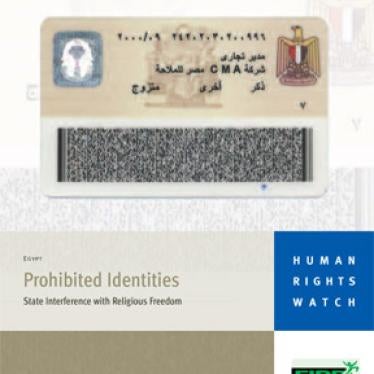(Cairo) - The new decree from Egypt's Interior Ministry recognizing the right of adherents of "non-recognized" religions to obtain necessary identification documents and access to basic services is an overdue and positive step, Human Rights Watch and the Egyptian Initiative for Personal Rights (EIPR) said today. The decree ends an official policy of coercing Egyptian Baha'is into misidentifying themselves as Muslims or Christians.
The ministerial decree, signed by General Habib al-Adly, the interior minister, on March 19, appeared in the Official Gazette on April 14 and entered into force the next day. He issued the decree three days after a Supreme Administrative Court ruling upheld the right of Egypt's Baha'i minority to obtain official documents, such as identity cards and birth certificates, without revealing their religious convictions or having to identify themselves incorrectly as Muslim or Christian.
"With this decree, the Interior Minister resolved a serious problem, albeit one that the ministry itself created," said Hossam Bahgat, executive director of the Egyptian Initiative for Personal Rights. "We will monitor how officials implement the new regulations over the coming weeks to ensure their swift and smooth enforcement."
This final court ruling in a case brought by the EIPR ended an arbitrary policy of the Interior Ministry's Civil Status Department (CSD) that for the past nine years has denied Baha'i Egyptians necessary identification documents unless they declared themselves to be adherents of one of the three state-recognized religions - Islam, Christianity, or Judaism.
Identification documents, especially identity cards and birth certificates, are mandatory for all Egyptians and necessary to obtain access to education, employment, family life, registration and immunization of children, as well as most basic daily activities such as opening a bank account, obtaining a driver's license, receiving pension or inheritance, or engaging in business transactions.
The ministerial decree (no. 520/2009) introduces a new provision into the Implementing Statutes of Egypt's Civil Status Law of 1994. The amendment instructs CSD officials to place a dash (-) before the line reserved for religion in the official identification documents of all Egyptian citizens who can produce documents showing that they, or their ancestors, were followers of a religious belief other than those recognized by the state. The change effectively means that Baha'is and other adherents of "non-recognized" religions would not have to list their religions on identification documents.
Human Rights Watch and the EIPR urged the government to ensure that the Civil Status Department officials establish evidentiary standards that do not unreasonably delay or otherwise impede Baha'i Egyptians from obtaining these required documents.
"This new decree abolishes an abusive policy that discriminated against citizens solely on the basis of their religious beliefs and without any basis in Egypt's statutory law," said Joe Stork, deputy Middle East director at Human Rights Watch. "We hope this means that the government intends to eradicate all policies that discriminate on the basis of religion and instead promote freedom of belief for all Egyptians.
A 2007 joint report by Human Rights Watch and the EIPR documented the Interior Ministry's policy of denying mandatory identification documents, where citizens must list their religious affiliations, to Baha'i Egyptians as well as to citizens who convert from Islam to Christianity. The report, "Prohibited Identities: State Interference with Religious Freedom", revealed how this policy was solely based on the government's selective and restrictive interpretation of Shari'a (Islamic law). It contradicts the state's obligation under Egypt's Constitution and international human rights treaties it has signed to protect the rights to freedom of religion, privacy and non-discrimination.







